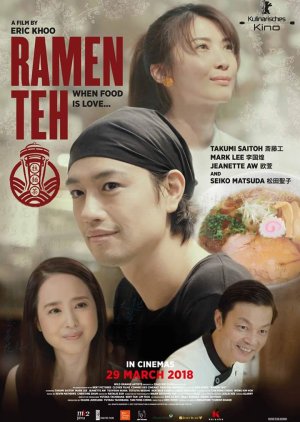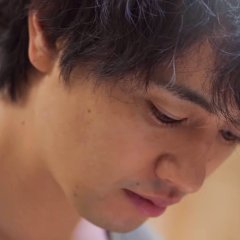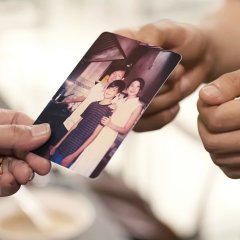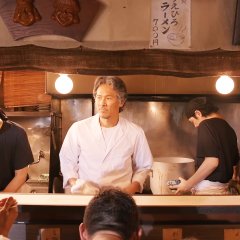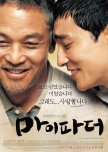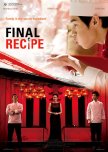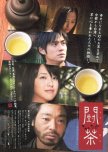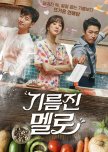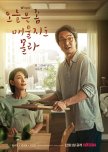Masato is a young ramen chef in the city of Takasaki in Japan. After the sudden death of his emotionally distant father, he chances upon a suitcase of memorabilia and a red notebook—filled with musings and old photos—left behind by his Singaporean mother, who died when he was just ten years old. Acting on a hunch, he takes off for Singapore with the notebook, hoping to piece together the story of his life, as well as that of his parents. There he meets Miki, a Japanese food blogger and single mother who helps him track down his maternal uncle Ah Wee, who runs a bak kut teh stall. Masato discovers that his grandmother Madam Lee is still alive, and that she holds the key to the tender yet turbulent love story of his parents. Masato and his grandmother try to heal each other's broken souls, and they find salvation in the kitchen, where the meals they cook become more than the sum of their ingredients. (Source: zhaowei.com) ~~ Co-production with Singapore and France. Edit Translation
- English
- Español
- magyar / magyar nyelv
- dansk
Where to Watch Ramen Shop
Cast & Credits
- Saitoh TakumiMasatoMain Role
- Jeanette AwMei LianSupport Role
- Matsuda SeikoMikiSupport Role
- Mark LeeUncle WeeSupport Role
- Ihara TsuyoshiKazuoSupport Role
- Bessho TetsuyaUncle AkioSupport Role
Reviews

Food that heals
Ramen Teh aka Ramen Shop was a sweet, nostalgic look at the romance of a young Japanese man’s parents when they lived in Singapore. Masato set off in search for familial answers and a recipe that was inexorably tied to his mother. If you enjoy films with food, Ramen Teh may leave you hungry as Masato cooked his way through his mother’s recipes and visited the Singaporean food scene.Masato works at his father’s popular ramen shop in Takasaki. Ever since his mother’s death when he was ten, he and his father have not been close. When his father suddenly dies Masato discovers his mother’s journal amongst his father’s belongings. Written in Mandarin, he’s unable to read it. Feeling a gaping hole in his heart, Masato heads to Singapore to find his mother’s brother who owns a small restaurant. Not only does he want help translating the journal, but he dearly longs for his mother’s Bak Kut Teh, a pork rib soup he’s never been able to duplicate. Miki, an on-line friend and Japanese food blogger living in Singapore, meets up with him and translates the journal. The journal includes not only his mom’s thoughts, but also her recipes. Masato finds his uncle who is overjoyed that his nephew has returned, but his grandmother will have nothing to do with him. Masato will test whether food can heal a broken heart and a broken relationship.
This film was very simple and predictable, but that doesn’t mean it wasn’t heartwarming. The story often flashbacked to his parents’ romance and their early married days when Masato was a child. Food figured prominently both in the past and present. It was also a nice travelogue as Masato visited the places from his parents’ photographs in Singapore. After discovering the reason for his grandmother’s hatred of the Japanese, Masato visited a museum that had a display detailing the atrocities committed by the Japanese during WWII. Shaken after learning the disturbing details from the war, he realized winning over his grandmother might not be possible. But Masato had secret weapons on his side--being a grandchild and developing a special ramen recipe to weaken her resolve.
Food, especially beloved family recipes, evoke strong emotions, it is a connection to family and friends, binding relationships through taste and life-giving sustenance. Even the familiar smell of a simple meal can transport a person to a happier place and awaken faded memories. Masato traveled in search of family, a recipe, and that which was thought lost, creating something very special along the way. While Ramen Teh had a tendency to meander, the final course was the pièce de resistance and enormously satisfying.
18 August 2025

Once again, MDL’s summary is absolutely on point. So, I’ll not bore you with another summary, just read the summary provided by MDL.
What I like:
+ Interesting to see the family dynamic of Masato. How he managed to search and reconnect with his maternal family.
+ It’s so funny to see how easily the grandson is able to soften his strong-willed grandmother’s heart.
+ It's interesting to see Japanese people dare to walk through an exhibit that shows their brutality during World War II. And to see Masato actually show remorse—there’s something profoundly honest and reassuring about that moment.
What I don’t too like:
On the joke side, I just wish they had shown us more of the dish. Haha…
Overall this is a journey of Masato to find and reconnect with his maternal family.

